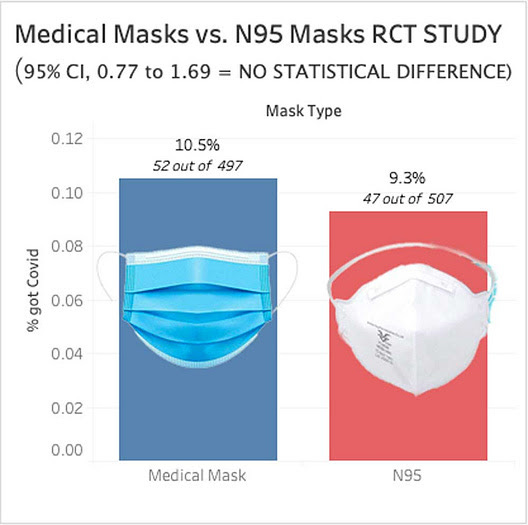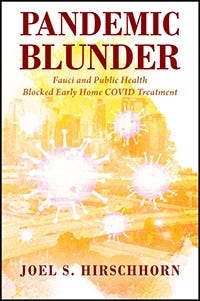A new study with the title “Medical Masks Versus N95 Respirators for Preventing COVID-19 Among Health Care Workers” shows no significant difference between two major types.
Here is the key summary graph of results:
The key finding is that there is a “failure rate” of about 10% for each mask type. Remember this study was for highly exposed health care workers. They were carefully tested to determine whether they got a COVID infection.
Here are some summary facts about the Randomized Trial run from 4 May 2020 to 29 March 2022.:
A total of 1009 health care workers who provided direct care to patients with suspected or confirmed COVID-19 in 29 inpatient settings in Canada, Israel, Pakistan, and Egypt. To be eligible for the study, participants could not have received a highly effective COVID-19 vaccine or had a known COVID-19 infection.
The researchers randomly assigned each participant to wear either a medical mask or an N95 respirator mask while at work for 10 weeks. All sites required staff to wear masks at all times at work. Participants then had nasal swabs for polymerase chain reaction COVID-19 tests if they developed symptoms. The researchers initially planned to enroll all participants in Canada but added the other countries when COVID-19 vaccination became available in Canada, making health care workers in Canada ineligible for the study.
Overall, confirmed COVID-19 occurred in 10.46% of the medical mask group versus 9.27% in the N95 respirator group. However, the results varied by country: 6.11% versus 2.22% in Canada, 35.29% versus 23.53% in Israel, 3.26% versus 2.13% in Pakistan, and 13.62% versus 14.56% in Egypt. All the data suggest a better result for the N95 type mask, but this may not be statistically significant.
There were differences between the countries related to which COVID-19 variant was circulating and how many participants had an undiagnosed previous infection when the data were being collected in that country. Although vaccination with a highly effective vaccine excluded participants, many participants in Pakistan and Egypt had been vaccinated but with less effective vaccines. In addition, the study was designed to examine a fairly large difference in infection risk and was unable to detect smaller differences.
When the researchers combined results from all the countries, the findings suggested that infection risk was not double or more with medical masks compared with N95 respirators. The findings by country varied, and this may have been due to differences in vaccine use, the number of people with previous infection, and the type of variant circulating.
If you have not read my book you have missed a lot of great information.






Dust masks don’t stop viruses. Industrial respirators do. My spray painting respirator which I restocked in January 2020 has worked. Not vaxed and never had a cold, sniffle or covid in three years. Doubt if I’ve been shed on. No ivermectin either, there isn’t any in Australia. Will they outlaw spray painting equipment?!?
Dr Hirschhorn, thank you for all you do!
I have a urgent question for you:
I have several family members who are having heart issues after being vaccinated. Do you know of or have you heard of a medication/supplement that can help prevent micro-clotting or perhaps help mitigate the effects of the spike protein? I seem to remember you mentioning something in a podcast but I can’t locate it.
I’m also asking because it is impossible to get any doctors to even talk to us about it. As soon as we raise the possibility that there heart damage is due to the vaccine/micro-clotting/spike protein, they won’t talk to us anymore. Any info you have would be very much appreciated. Thanks!